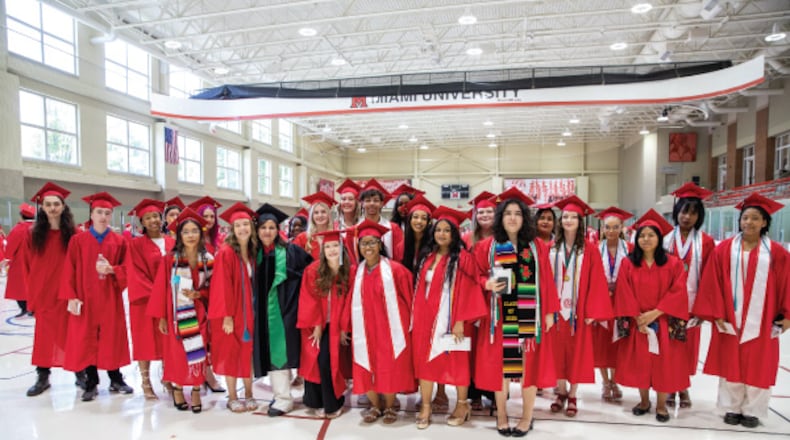Designed as a higher education pathway for first-generation college students and those from underrepresented backgrounds, Early College Academy offers high school juniors the opportunity to take 15 credit hours each semester during their junior and senior years, according to Miami officials.
The number of area ECA graduates more than doubled this year, said Miami officials.
Nearly 75 students from nine area high schools will graduate with their high school diploma and an associate degree in general studies, up from two high schools and fewer than 30 students last year. More than half of these graduates will be continuing their education at Miami, either at the Hamilton and Middletown regional campuses or at the main Oxford campus, said Laurel Gilbert, interim director of Dual Credit Programs.
While many early college high school programs offer students the chance to get ahead in their college credits, Miami’s program is unique in bringing its ECA participants to the regional campuses to take part in college level courses with college professors and students and enabling them to graduate with a two-year degree in hand.
Students say the experience of being on campus and exploring opportunities for academic enrichment, research, social connections, and interpersonal relationships with professors has made a big difference in their educational journey, opening doors.
Kaydence Young, a graduate of Middletown High School, said combining high school commitments and her classes at Miami Regionals was challenging because of her busy schedule of activities. She continued her participation in cheerleading, orchestra, softball, and was even president of her school’s National Honor Society chapter.
“At first, it was difficult to juggle two different atmospheres and locations, but I adapted well,” said Young, who graduated near the top of her high school class.
After graduation, students can continue at Miami or take their credits to any public university in Ohio to continue their education. They can also choose to enter the workforce with their associate degree, giving them a competitive advantage, said Miami officials.
According to Miami ECA officials, Young chose ECA because she wanted to get a jump start on her college plans. She now hopes to eventually attend medical school and become a radiologist. She will attend Ohio State University in the fall to continue her studies toward a four-year, undergraduate degree.
“It feels like a weight has been lifted off my shoulders,” she said of graduating with her associate degree. “I’m halfway there.”
Programs such as ECA are part of nationwide efforts to increase college graduation rates for underrepresented groups and first-generation college students.
Among ECA seniors this school year, 80 percent are first-generation college attendees and 36 percent are from underrepresented groups, Gilbert said. Overall, roughly 66 percent of ECA participants have been first-generation college students.
“They are taking in-person classes with other college students,” Gilbert said. “We integrate them into the campus experience. But we also have dedicated staff to assist them along the way, so they are never left to figure it out without help.”
“The vast majority of our ECA students are successful and go on to complete a four-year degree,” Gilbert said. “It really has been an effective program.”
About the Author

